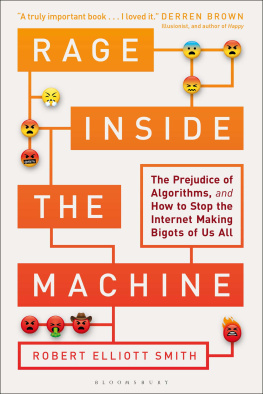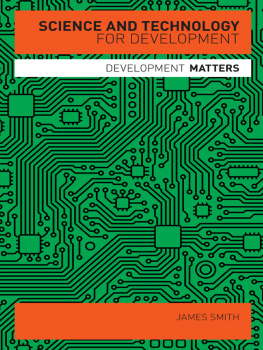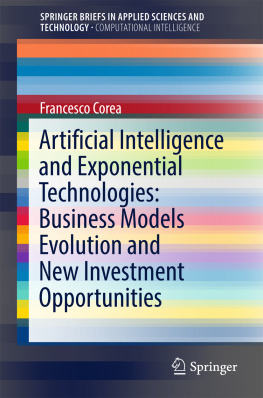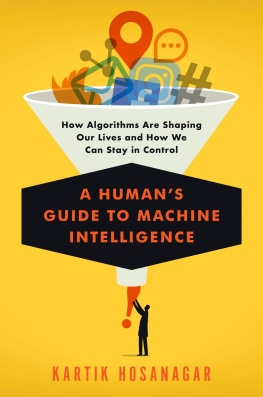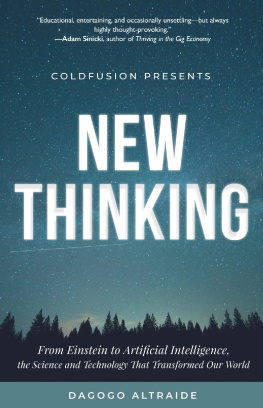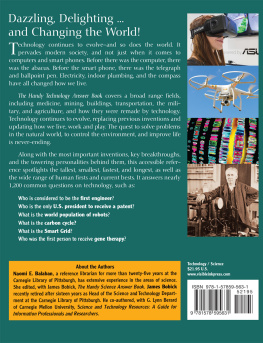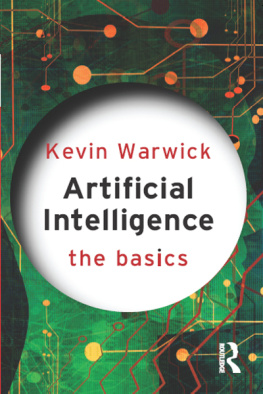
RAGE INSIDE THE
MACHINE
PRAISE FOR
RAGE INSIDE THE MACHINE
In Rage Inside the Machine Rob Smith has written a fascinating hybrid text a compelling memoir, a moving mosaic of history and technology, and, most important, the timeliest of warnings for our increasingly dangerous era of ubiquitous AI and algorithms. As Millennial and Generation-Z engineers blithely put us in AI-driven vehicles, as companies take AI and algorithmic start-up funds by the millions, and competing governments devise AI weapons programs by the billions, Smith reminds us that AI is the hole, not the doughnut, and, despite our best efforts, AI is not intelligent in any meaningful biological sense. The dumbest squirrel is still more intentional and broadly clever than the smartest extant algorithm, and until researchers seriously consider how humans and machines differ in the sense that Smith intends, we all must be vigilant against the hype and ethical missteps by businesspeople and technologists who arent sufficiently reflective to apply the dangerous technologies carelessly placed in their hands. Read this book and take its carefully crafted message to heart.
DAVID GOLDBERG, author of Genetic Algorithms in Search, Optimization and Machine Learning
AI isnt just a technical topic, it is a cultural crossroads. Correction: it should be. If enough people read this book, it will be. In Rage Inside the Machine, Robert Elliott Smith accomplishes what few people could attempt: to humanize the discourse on artificial intelligence. He tears the topic of AI from the grasp of the techno-elite and puts it into all our hands. Robert the computer science professor lays bare exactly what the algorithms are doing, while Robert the boy who grew up in newly desegregated Alabama lays bare the biases scientific and social that risk being hard-coded into our culture all over again (mostly, without even the programmers realizing it). The mass adoption of AI is happening, right now. The next decade of design choices will shape the next century of social consequences. We society need to weigh in on these choices now. This book is our chance.
CHRIS KUTARNA, co-author of Age of Discovery: Navigating the Storms of Our Second Renaissance
A beautiful, accessible, truly important book. Rob humanises the dark and confused topic of AI and calls us to action. He places dispassionate modern algorithms in their historical and cultural context, revealing how our all-too-human biases are propagating through opaque technology to create a monster. Gorgeously written and hugely relevant: I loved it.
DERREN BROWN, illusionist and author of Happy: Why More or Less Everything is Absolutely Fine
In an age when more and more decisions of our lives are made by algorithms, its vital for anyone, not just techies, to understand how data can change our lives. What if something you posted on social media was used against you? What if you could not appeal against an unfair court decision, because the algorithm thought you were guilty? Sounds like a dystopia, except that its not its already happening every day. We can no longer afford to say that this is a matter for specialists, or we have nothing to hide we need to start taking responsibility for what we share, and who with. Rob Smith has a unique ability to express the complicated future of AI in a very simple manner. Read it if you want to stay human.
DR ANASTASIA DEDYUKHINA, Founder of Consciously Digital and author of Homo Distractus
When the crowd at Comic Con talk of Robot Overlords, it can be disregarded as a fantasy far detached from real life. When you hear that a crowd of world-class technologists and scientists, including Elon Musk, Bill Gates and Stephen Hawking, have publicly voiced their concerns that advanced AI technologies could pose an existential threat to humanity trouble on the scale of climate change, bioplague and large asteroids you really have to wonder whats going on. Rage Inside the Machine is a guide to how we got here, conceptually and historically. Rob Smith appreciates the successes of AI, but also warns that incomprehensibly complex data-driven systems are not easily corrected, and can make major mistakes.
DAVID LEINWEBER, author of Nerds on Wall Street: Math, Machines and Wired Markets
I have long been a fan of Rob Smiths ability to give context and consideration to the intrinsic yet intricate role technology plays in our lives. Here in this extraordinary book, he has outlined his crafted, well-measured, respectful and well-reasoned approach based on decades in industry and academia. He shines a light on the dangers of accepting a passive role in our relationship with tech, and deftly explains the information we really need to know before committing ourselves further to machines. Essential reading for anyone wanting to know how to keep their sanity and humanity in the age of super-tech.
HELEN BAGNALL, Founder of Salon London
To my tireless reader, insightful editor, constant inspiration, and wonderful wife, Paula Hardy. She made this book possible.

CONTENTS
The path to a world dominated by machines and machine intelligence now seems inevitable, and we are told to feel confident in these predictions, in part because they themselves are the results of algorithms that have analysed real-world big data, thus avoiding human subjectivity. A belief in algorithmic objectivity is not at all unusual today. Furthermore, there is a widely held tendency to assume that digital technology is inevitably meritocratic, democratic and libertarian, and that any regulation would have a negative effect on its optimal, self-organizing systems.
So-called smart AI is now being used to understand such big data and draw conclusions from that data that profoundly influence our lives in the real world. Algorithms do everything from assigning people hour-to-hour work (Deliveroo, Uber, etc.), to selecting the news we read (Google, Facebook, recently revealed that in China, 80 percent of surveyed citizens approve of a government-sponsored big data algorithm that will soon reduce all of their individual financial, civic, and social media activity (along with inputs from CCTV systems that can recognize their faces) to a single score, which will determine their access to travel, housing, healthcare, and high-quality goods.
Even in the Western world, we largely accept (with some enthusiasm) that online algorithms process data about us and shape most of our interactions, yet were largely unaware of exactly how, mostly dont understand their operation, and barely grasp the influence they exert on our lives. Our willing, but uninformed, consent to their operation in our lives implicitly assumes that these AI programs are benign and unbiased, because they can only perform rational computations. We believe that the results served up to us in online lists and searches are a true reflection of the world and the choices available to us therein. Numbers dont lie, and since machines just process numbers, neither can they.
However, in the last few years, algorithms have been generating some surprisingly unsavoury and unexpected outputs. In 2015, the Guardian reported that Google algorithms tagged images of black people as #animals, #apes and #gorillas.
You may well ask yourself, What on earth is going on? Have racist and misogynistic computer programmers run amok in their Silicon Valley offices and created algorithmic monsters imbued with humanitys worst characteristics? Do these unbiased, objective algorithmic results simply reveal the ugly truth about human society hidden in our big data? Or is there something else entirely going on? And is that something else something specific about the algorithms themselves? If so, what is it, and how is it affecting us and society at large? And how can it be stopped and changed for the better?
Next page
